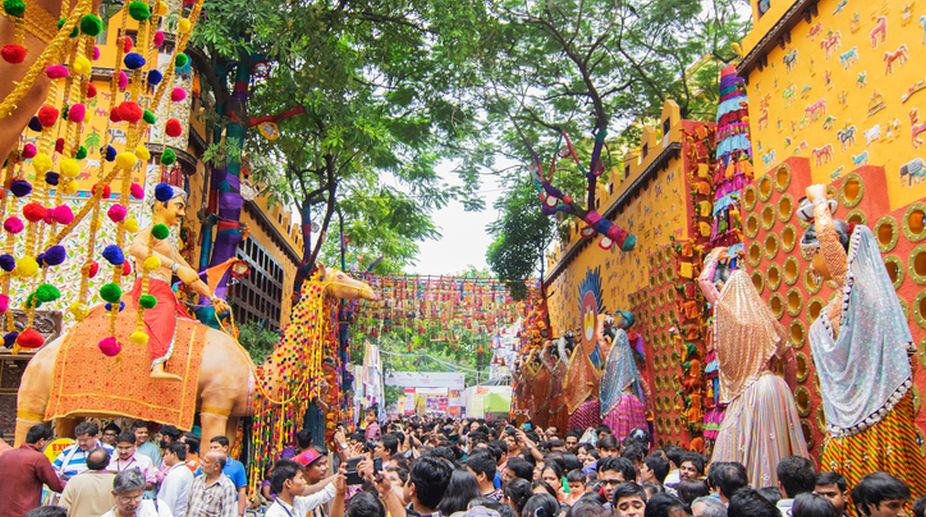Poila Baisakh: Significance of the rich tapestry of this celebration
Discover the richness of Poila Baisakh, the Bengali New Year celebration, marked by traditions, feasts, and cultural events across West Bengal.

Representational Image (Getty Images)
Durga is unique in Delhi because of the community feeling that it fosters. It also show cases the inherent Bengali talent in fashion, art, music, poetry, recitation, drama, literature, cuisine and much else.
Puja pandals thus become melting pots of creativity and local artistes and children get as much opportunity to display their talent as professional artistes. A noteworthy feature of almost every community puja is the Ananda Mela, or the Ladies Fair, organised by the local women on the inaugural day of the Durga Puja celebration, where they are encouraged to sell their wares ~ mouth-watering eatables, handicrafts and so on ~ at nominal prices.
The food stalls set up at most of the puja venues offer a rich fare of Bengali and Mughlai cuisine and attract huge crowds. The Puja souvenirs published by the puja committees, though primarily a vehicle for collection of funds, also boast of scholarly articles on religion, art and culture by local litterateurs.
Advertisement
Puja budgets have been rising over the years, even exceeded Rs 1 crore depending upon the scale of celebrations. Donation, therefore, takes a back-seat and corporate sponsorships and souvenir advertisements sustain the Pujas.
It’s now fashionable for major Puja committees to out-compete each other by roping in eminent artistes and cine-stars from Kolkata and Mumbai. A few decades back, one could spot Hemant Kumar or Manna Dey regaling mesmerised audiences or President Sarvapalli Radhakrishnan and Prime Minister Indira Gandhi offering prayers at New Delhi Kali Bari and Kashmere Gate.
On the morning of Dusshera, married ladies bid the Goddess goodbye and smear vermilion on each other with gay abandon, a ritual called “sindur-khela”.The immersion ceremony is held on the banks of the River Yamuna.
The Joint Durga Puja Procession Committee, established as early as 1959, has been responsible for the procession of Durga idols of the various community pujas. Extensive arrangements are made to facilitate the immersion process of the idols using mechanised cranes and boats.
After the customary Dhunuchi Naach (dancing with burning incense), the idols are immersed one by one. Going green, some Puja committees have now started immersing their idols in makeshift ponds at the Puja venue itself.
The images are also made with natural non-toxic elements that are easily soluble in water. After immersion, the holy water of the Yamuna, is brought back to the puja-pandalsin metal vessels and sprinkled among the devout as “Shanti Jal” by the priest’s amid chanting of Vedic Peace Mantras, bringing down the curtain on the Puja festivities.
It is with genuine pride that this newspaper recalls that Marshal of the IAF Arjan Singh was one of its most committed readers. He once said he had begun to read The Statesman during his college days, and subscribed to it ever since.
He had been interviewed by the paper several times, and was always incisive in thought and analysis. One memorable interaction was during the first Gulf War when he waxed eloquent on the strategic employment of air power.
Though he did not say so on that occasion, it was a reminder of his regret that the IAF was not used to blunt the Chinese assault in 1962. Arjan Singh had a special love for The Statesman Vintage and Classic Car Rally in the Capital, which he flagged-off twice.
First when Chief of the Air Staff, and again when elevated a “five-star General”. When invited to do so a second time, his immediate response was “I would be delighted”.
Come festive days, whether it’s Puja or Diwali, it’s a traditional ritual to give gifts and sweets to helps and maids at home.
The gifts are usually in the form of clothes and/or cash. It depends on individual households as well as the relationship with the help, how much or expensive the gifts are. Sharing her experience, a colleague narrated how maids now start expecting good gifts.
Since they work in more than one house (generally four to five), they even start comparing. Last year, during Diwali, our colleague recalled, she gave the usual clothes and sweets. The maid instantly began grumbling, saying, “What is this you have given me? You are a working woman and can certainly afford to give better than this!” Dumbstruck, our colleague could barely control retorting that she had to take care of the rest of the family too.
Another colleague recounted how her maid did not like the choice of clothes, even though it was bought from a good, high-end shop. It is better to just give her money and ask her to go buy whatever she wanted with it, our colleagues asserted.
Our inhouse wag wonders how Rahul Gandhi will succeed where UPA and BJP governments failed ~ creating jobs.
(Contributed by: Dilip Guha, RV Smith, Bhaskar Roy, Keith Flory, Swimmi Srivastava and Asha Ramachandran)
Advertisement